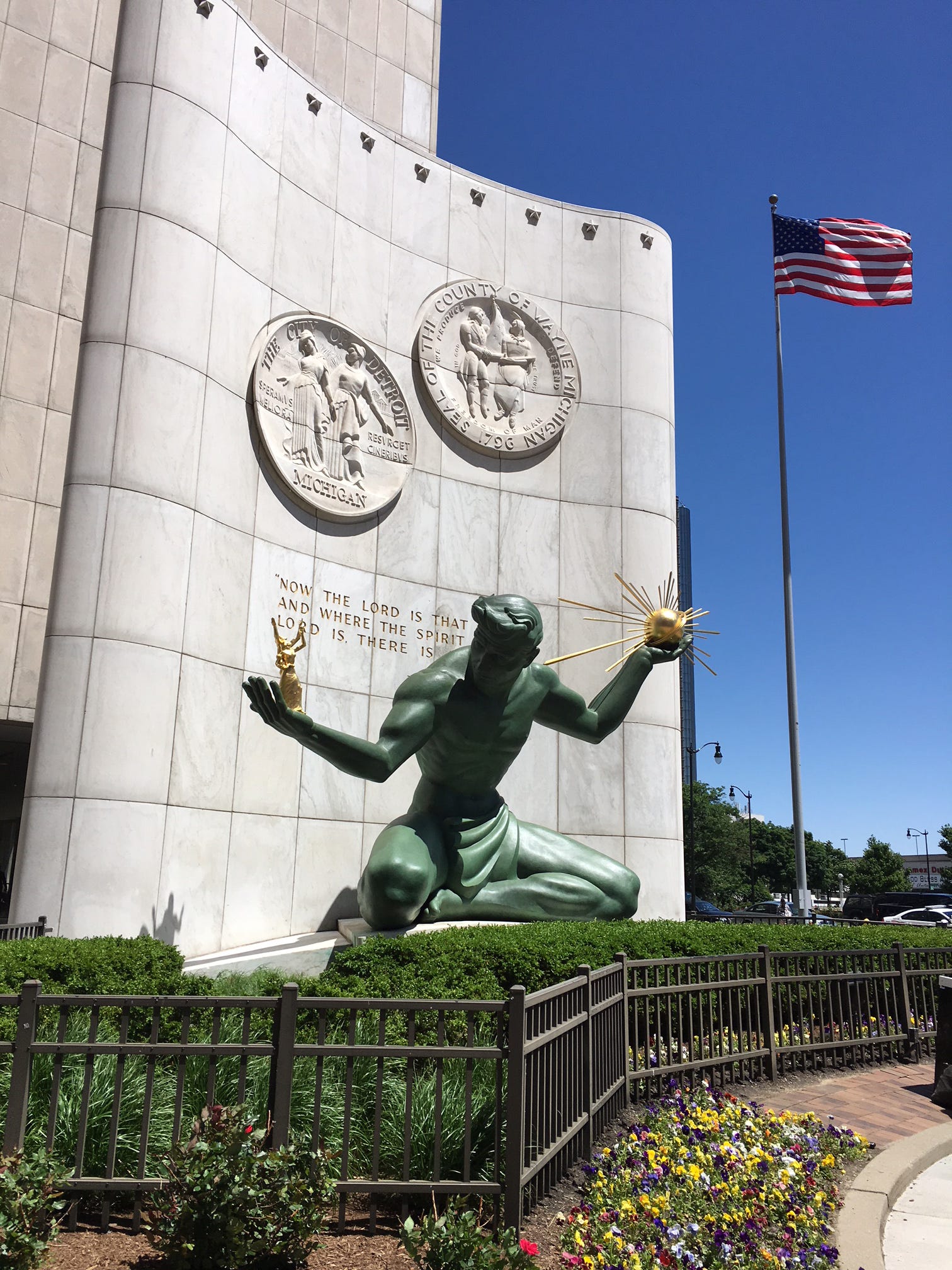Howes: Five years after bankruptcy, Detroit shows real gains
 Daniel Howes
Daniel Howes
At 4:06 p.m. Wednesday, people involved in Detroit’s historic bankruptcy will gather at Republic Tavern on Grand River to mark the event that changed the city’s trajectory.
They’ll likely greet old friends, their bonds forged in the crucible of high-stakes negotiations. They’ll tell stories. And it’s probably safe to say Chief Mediator Gerald Rosen, a now-retired federal judge, will recount the “grand bargain” that helped speed a consensual settlement of the largest municipal bankruptcy in American history.
But the celebration belongs to the city itself. It belongs to residents who persevered darker times marred by dysfunction and corruption at City Hall, to pensioners forced to surrender a portion of their expected benefits in a process that threatened to mire the city in years of litigation, to business leaders who invested before the downward spiral accelerated.
Five years to the day after the city’s lawyers filed for Chapter 9 bankruptcy, Detroit’s reinvention is tracing a decidedly upward arc. It’s produced four balanced budgets, received three credit upgrades, improved delivery of basic city services, imposed fiscal discipline and attracted billions in private-sector investment.
“It’s Detroit’s big-bang theory,” Rosen said, “unrelated people and events colliding together in the same space to overcome distrust, cynicism, self-interest and the ghosts of Detroit’s past mistakes … to help rescue an iconic American city.”
New street lights glow every night across broad swaths of the city. Renovation is creeping outside the so-called "seven-point-two" — the 7.2-square-mile patch of downtown and Midtown proving magnets for both Big Money and smaller plays for restaurants and bars, retail and housing. An estimated 10,000 new housing units are planned or under construction.
Hometown automakers are delivering a lengthening string of record, or nearly so, profits in North America, thanks to a growing national economy. General Motors Co. is an acknowledged leader in development of self-driving vehicles, and rival Ford Motor Co. plans to overhaul the 105-year-old Michigan Central Depot in Corktown and use it to anchor a campus devoted to mobility, autonomy and electrification.
Read more: Bankole: After bankruptcy, Detroit retirees feel deprived
Read more: Mike Duggan: Mayor instrumental to Detroit's turnaround
"The momentum continues to build," said Dan Gilbert, chairman of Quicken Loans Inc. and its family of affiliated companies. "These things tend to be geometric. You're seeing it daily. When you start seeing buildings being erected" on the J.L. Hudson's site and the Monroe block, "it's going to bring a whole new sense of optimism here."
All of that, and more, are combining to revise the narrative about the nation's longtime poster child for disinvestment, de-industrialization and decline. By almost any measure, that’s success — especially for a city so much of America, even Michigan, gave up for dead.

"The discussion before the bankruptcy was when is the city going to implode," said Bill Nowling, press secretary and adviser to former emergency manager Kevyn Orr, who returned to Jones Day's Washington office. "Now it's how far can the city go, and what's next? That's the biggest tell that the bankruptcy made a difference."
Did the case that threatened to pitch the city into protracted legal battles with creditors and city pensioners, with the city-owned Detroit Institute of Arts, make the city's continuing reinvention possible? Probably not by itself, because municipal bankruptcy by definition is a restructuring of the city's balance sheet, chiefly debt owed to creditors.
Detroit owes its new status as one of the hottest major cities in America to the confluence of people, circumstances and leaders who recognized both the downside risks and upside opportunities the bankruptcy could help deliver. Refinanced debt that would lessen the city's financial burden; rationalized operations that could more reliably provide city services; stable management under a new, business-oriented mayor that would encourage investment.
"The biggest advantage" of bankruptcy, Mayor Mike Duggan said in an interview, "is we're not having any trouble managing our finances. We've gotten predictable. Things like if you want to build housing in the city with city support ... everybody knows the rules: 20 percent's going to be affordable, and if you're willing to do it, there will be a package of incentives. It's the predictability."
And the leadership, a critical component to post-bankruptcy momentum. In a region accustomed to decades of bickering between city and suburb, union and management, black and white, Republican and Democrat, the bankruptcy five years on stands as an example of Rosen's "people colliding together" to find common solutions to decades-old problems only getting worse with time.

A Republican governor who didn't act like a typical Red-State Republican; a Democratic mayor who prized pragmatism and results over ideology and politicking; mediators under Rosen who understood the stakes and tried, like U.S. District Judge Victoria Roberts, to make sure the city's union leaders did, too.
That's not all. President Barack Obama's Justice Department in the person of U.S. Attorney Barbara McQuade launched a roll-up of public corruption that jailed a Detroit mayor, Kwame Kilpatrick, convicted a one-time City Council member, Monica Conyers, and successfully targeted corrupt officials in Wayne and Macomb counties.
The legal crackdown cannot be underestimated for its positive effect on civic morale and business confidence. It's reassurance that someone is willing to police the pols — even if many of them hail from the same political party. That's not insignificant.
"We've seen an accentuation of responsibility," said Rip Rapson, CEO of the Kresge Foundation, a major financial backer of the grand bargain. "The transformation from despair to holding pattern to progress is remarkable."
It's not unnoticed, either. A new normal is setting in: business that for decades decamped downtown for the suburbs is returning, reversing a mostly one-way capital flow; investment in downtown now is measured in billions; a new sense of civic pride and can-do spirit has emerged, with business and political leaders now angling to push the reinvention deeper into the city's neighborhoods.
"The spirit and pride and excitement in the city goes beyond the seven-point-two," said George Jackson, retired CEO of the Detroit Economic Development Growth Corp. "When people visit the city they can feel it. I see a spirit with everybody — city residents and suburbanites. We've come a long way, and we should be proud."
daniel.howes@detroitnews.com
(313) 222-2106
Daniel Howes’ column runs Tuesdays, Thursdays and Fridays. Follow him on Twitter @DanielHowes_TDN, listen to his Saturday podcasts, or catch him 3 and 10 p.m. Thursdays on Michigan Radio’s “Stateside,” 91.7 FM.